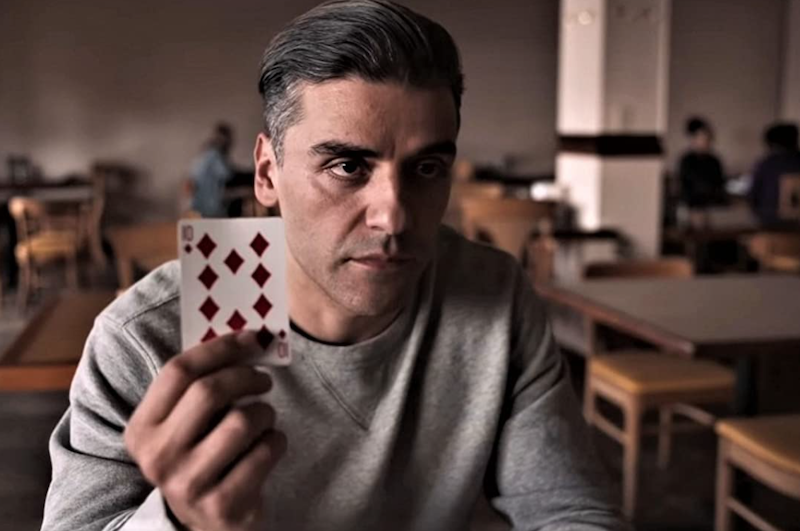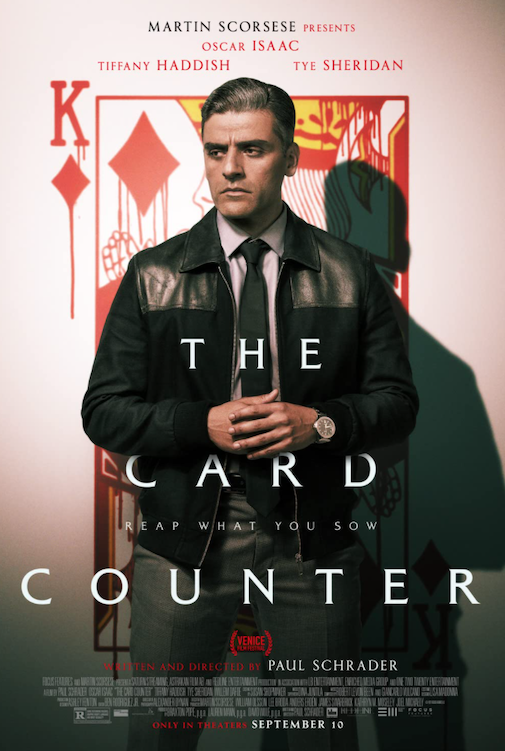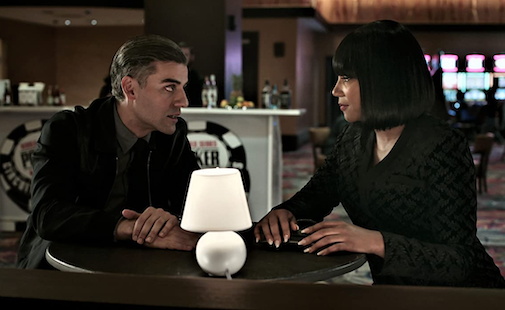by Lynn Lee

Is it too early to start an “Oscar for Oscar” FYC campaign? Because there needs to be one for Oscar Isaac in The Card Counter, stat.
Sadly, it’s not at all a given that he’ll get much traction. Initial reception of The Card Counter among critics has been positive but rather muted, and the film hasn’t made much of a mark with general audiences. It probably doesn’t help that the trailer gives the misleading impression of a snappy, heisty movie about a poker player with a shady past when in reality it’s a slow-burn Paul Schrader Dark Odyssey into the Mind of a Morally Tormented Man. Schrader fans, at least, will get what they’re expecting; Isaac fans will get that and so much more...
 Isaac plays a card shark with the alias “William Tell” and a whole lot weighing on his soul. In his previous life he committed truly heinous acts that are only gradually revealed via flashback sequences marked by an especially disorienting fisheye lens. Even though Tell has done time for his crimes and prison has taught him to reflect and write as well as count cards, it clearly hasn’t expiated the guilt that haunts both his waking life and his dreams. It’s why he only plays for modest stakes and tries to live as anonymous and low-profile an existence as possible, moving constantly between nondescript motel rooms and the starkly lit, surreally banal world of 24-hour casinos.
Isaac plays a card shark with the alias “William Tell” and a whole lot weighing on his soul. In his previous life he committed truly heinous acts that are only gradually revealed via flashback sequences marked by an especially disorienting fisheye lens. Even though Tell has done time for his crimes and prison has taught him to reflect and write as well as count cards, it clearly hasn’t expiated the guilt that haunts both his waking life and his dreams. It’s why he only plays for modest stakes and tries to live as anonymous and low-profile an existence as possible, moving constantly between nondescript motel rooms and the starkly lit, surreally banal world of 24-hour casinos.
Things start to change when Tell is approached by two very different people with very different intentions. One is La Linda (Tiffany Haddish), a woman who runs a “stable” of high-roller poker players and has her eye on Tell for both professional and romantic reasons. The other is a young drifter named Cirk (Tye Sheridan), whose father committed the same offenses as Tell and paid an even heavier price. Cirk is bent on revenge, not against Tell but against the architect of their crimes (Willem Dafoe), who managed to get off scot-free and whom Cirk holds responsible for the ruin of his family. Hoping to steer the boy away from a path he knows can lead to no good, Tell accepts La Linda’s offer of sponsorship and takes Cirk along with him on the circuit.
If that setup feels rather schematic, that’s because it is. The result is a meandering yet metaphorically charged journey with a dark third-act turn that feels dramatically inevitable even as it stretches narrative plausibility. As is often the case with Schrader – most recently in First Reformed – the film builds mesmerizingly to a disturbing climax, only to end on a note of hope that doesn’t feel completely earned. Perhaps by the same token, other than Tell the characters in The Card Counter feel more like constructs or concepts than fully fleshed-out human beings. Of these, Haddish fares the best: while she may seem like odd casting for such a somber picture, she adds a welcome spark of warmth to a part that frankly isn’t all that interesting as written. Sheridan conveys the callowness but not the anger that’s key to Cirk’s motivations, while Dafoe disappointingly gets too little to do despite being the ostensible bogeyman of the film.

Still, The Card Counter ends up packing a powerful punch thanks to Isaac, who delivers possibly the best work of his career here. Initially, and appropriately for a World Series-caliber poker player, his face is virtually unreadable – the Tell without a tell. However, at fleeting moments when he’s alone or with Cirk or La Linda, we see glimpses of profound pain and unabsolved guilt under that politely imperturbable mask. Most unsettling of all is a scene late in the film when Tell has a come-to-Jesus moment with Cirk, paradoxically by calling up all the demons he’s been keeping so tightly locked away. With a quiet yet menacing shift in his expression and body language, he becomes a different, almost unrecognizable person. It’s as if he finally removes the mask; or is it that he puts on another one that he hasn’t worn in years? Either way, the transformation is fucking terrifying and should be Isaac’s Oscar clip right there.
The ambiguity of just how deep the evil goes underscores a broader moral question hanging over the entire film, about whether Tell can ever redeem himself. The film also gestures towards the idea of a larger, national guilt that’s borne by individual casualties like Tell, even though it doesn’t really delve into the implications of that transference. In a way, it doesn’t need to: they’re written all over Isaac’s beautifully frightening face. Even if that’s not enough for the Academy – they ignored Ethan Hawke’s equally brilliant work in First Reformed, after all – Isaac’s performance should be getting way more attention than it’s received so far. Here’s hoping that awards bodies remember him and give The Card Counter another look as we head into precursor season. He certainly deserves it.
